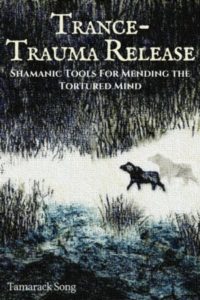by Tamarack Song
Trance-Trauma Release is the last book in my trauma release healing trilogy, designed to help contemporary readers rediscover Traditional methods of regaining balance after stressful or traumatic episodes. It is, more than anything, a lesson in reclaiming and uplifting our primal self.
Traditional healers and Zen masters have been aware of trauma and trauma memory for thousands of years, and they have been treating them successfully. What we know from these healers and masters is that the concept of Post-Traumatic Stress Disorder (PTSD), which emerged after 1980, can’t provide a solid foundation for healing because what we are addressing is not post-traumatic at all, but present-traumatic. It is the lifestyle adjustments, coping mechanisms, and cover-ups precipitated by the traumatic episode, which continue to affect our lives—what I call traumatic memory or shadow trauma. How we adapt to trauma harms us as much as the original episode. Deep healing can only happen in the present, with somatic and trance based modalities.
Because we are dealing with the present reality, rather than the traumatic episode itself, there is no need to recount the episode. In terms of our healing, it no longer matters what happened, who the perpetrators were, or whether they are dead or alive. That is, it no longer matters to the healing. There may be unresolved legal issues, relationship dynamics, and other factors; however, they are separate and distinct from this the somaticand trance healing processes.
Here, in Trance Trauma Release, we go in-depth into the fuller range of gateways available to us. Each is rooted in the body and the limbic process because our trauma memories themselves are wordless and stored in our somatic self. which exists in a wordless reality—as do the body and the limbic process. It is only by entering the trance state, that we can become our somatic selves and access the memories to heal them. Talk therapy removes us from the physio-emotional center of our experience and takes us out of the trance state because it forces us to translate visceral sensations into specific, subjective words. In the trance state, we can be with our trauma memory and not judge or react, just observe. We can then gain the perspective to realize that even though it was something terrible, it does not have to derail our lives.
Check out the table of contents here.

